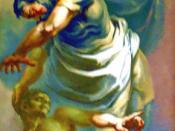The divine command theory is the idea that moral actions are those that conform to God's will. For example, murder is wrong because God condemns it. Using this theory, there is a test for determining whether any action is right or wrong: if it conforms to God's will, it is morally permissible, but if it does not, then it is impermissible. This seems very simple. However, the theory breaks down when the will of God is examined. This is the reason for theists to reject the divine command theory. It is not necessary for others who do not even believe in the existence of God to start down the divine command theory path. Wondering about what a supreme creator decrees would be pointless if you don't believe in the supreme creator initially.
In the Euthyphro dialogue, the dilemma concerns Socrates' discussion with Euthyphro. The discussion is about what piety is.
Euthyphro believes that his actions are pious; Socrates challenges him to define "pious." Euthyphro's answer is that, '... piety is what all the gods love, and that impiety is what they all hate'. However, Socrates then asks if the gods love piety because it is pious, or is it pious because they love it. Socrates wants Euthyphro to prove what piousness is using logic. He is unable to do so because the divine command theory doesn't stand up under thorough scrutiny.
Socrates points out that what is pious must be pious outside of the fact that the gods love it. If they love it, we have no information to explain why they love it. It could be totally arbitrary that they love it. The only thing that can be determined is that they love particular acts. The fact that they recognize an act as pious would in fact...


